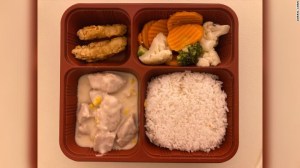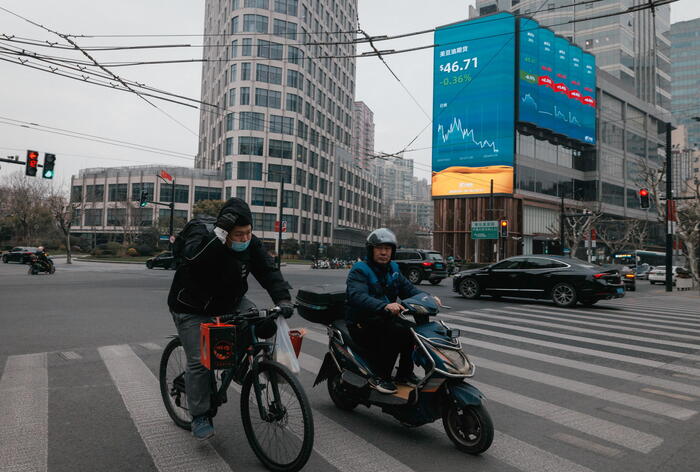See how they disinfect an entire Chinese city by covid-19 0:49
Hong Kong (CNN) -
Darryl Chan tested positive for COVID-19 when he landed in Hong Kong last month.
More than two weeks later, and despite showing no symptoms, he remains isolated in a hospital bed with no signs of allowing him to leave.
"I think the worst thing is not knowing when I can get out," he said.
"You almost feel like you're back at school, waking up and sleeping in control, (and) not being able to control what you can eat."
Hong Kong, along with mainland China, is one of the few places in the world that still has a zero covid policy.
The city's priority is to reopen the borders with the mainland, not with the rest of the world, Hong Kong authorities said.
That means most non-residents are barred from entering, while almost everyone arriving from abroad must go through 21 days of quarantine, even if fully vaccinated.
Hong Kong considers UK travelers as high risk for the omicron variant, subject to its most stringent testing and quarantine measures, which include spending the first four days in a government camp.
advertising
Traveler Darryl Chan awaits the results of his coronavirus test at the Hong Kong airport on December 19, 2021.
On December 19, Chan flew from London to Hong Kong to start a new job.
Chan said he was fully vaccinated and had a booster dose and had tested negative for COVID-19 several times before his flight.
He was mentally prepared for the quarantine, but not for what happened next, he said.
Upon arrival in Hong Kong, Chan took a mandatory covid-19 test and waited hours at the airport.
Your result was determined to be "preliminarily positive," which means you were asked to take another test.
He was then moved to a cordoned off area with a makeshift bed.
"It was definitely a bit shocking," Chan said.
"Having done so many tests in the week before my flight, and they all came back negative ... I never thought I would actually test positive on arrival."
About 13 hours after his plane landed, Chan was taken by ambulance to a nearby hospital for further tests.
It was later confirmed that he had the omicron variant, although he remained asymptomatic.
"(I had) this feeling of dread, where you say, 'Oh, God, what's going to happen now?'" He said.
"I definitely felt pretty trapped ... you can't just say, 'I'm going to fly back and go somewhere else.'
You really are stuck there, so it was a pretty scary feeling. "
ANALYSIS |
Outrage Over Xi'an Shutdown Tests Limits Of "Zero COVID-19" Policy In China
Hong Kong: confinement due to covid-19 (2021) 0:28
Hong Kong's measures and its 'zero covid-19' policy
It's not just travelers who face indefinite hospitalization when they test positive for COVID-19 in Hong Kong.
In recent days, Hong Kong identified several cases of the omicron variant in a group linked to the aircrew, breaking a nearly three-month streak with no locally transmitted COVID infections.
The confirmed infected were also sent to the hospital.
Meanwhile, hundreds of people, including more than 20 restaurant employees, considered close contacts of the positive cases, were sent to the government camp for 21 days of isolation and extensive testing.
Any positive result would mean a transfer to the hospital.
Anyone who has attended the same facilities as the positive cases around the same time in recent days was also ordered to take a test, while several residential buildings linked to the group were temporarily blocked for mass testing.
As fears of local omicron broadcasting mounted, Hong Kong leader Carrie Lam said Tuesday that the resumption of normal travel between the city and mainland China "will have to wait another time."
Just before the cluster emerged, Lam reaffirmed Hong Kong's zero covid stance.
"Hong Kong has been taking very strict measures to protect against importation of cases with a view to keeping local infection zero," it said in a statement on December 28.
"Faced with the fierce omicron attack, we must be even more vigilant."
Trapped in the hospital
According to Hong Kong authorities, the minimum isolation period for anyone who tests positive for COVID-19, even if they are asymptomatic, is almost a month.
They must stay in the hospital for at least 10 days and are not allowed to leave until they test negative twice in a row, no matter how long it takes.
But even testing negative twice doesn't mean people can go home.
After that, those under confinement orders are transferred to an isolation center for a further 14 days.
Upon arriving at the hospital, Chan was admitted to an isolation room with two other travelers who tested positive, also with omicron.
He is confined to his room 24 hours a day with no fresh air or outdoor exercise.
His day follows a routine established by the hospital.
At 8 am, he is awakened by a jingle on the public address system and an announcement reminding him to take his own vital signs.
Chinese police subject four suspected smugglers accused of violating COVID-19 restrictions to public humiliation
A meal at the Hong Kong hospital for inmates after testing positive for COVID-19.
You receive the meals provided by the hospital at fixed times.
Meanwhile, spend the day connecting with family and friends on social media and watching Netflix.
"I would say that early or mid-afternoon is probably the hardest time of the day," he said.
"In the morning, you check your emails or social media. But by the time lunch rocks, that's when you say, 'I really don't know what I'm going to do.'
While you say your doctors have been very professional, they cannot tell you when you can be discharged.
"It all depends on when I stop testing positive, and then they start the final countdown from that point," he said.
Darryl Chan has no idea when he will be allowed to leave the hospital after testing positive for COVID-19 in Hong Kong.
The mental consequences of isolation
Since the start of the pandemic, Hong Kong confirmed more than 12,600 cases and 213 deaths, according to government figures - that's far less than many comparatively sized cities in other parts of the world.
But while its zero-covid approach has shielded residents from increased hospitalizations, the city has struggled with vaccinations, even though free vaccinations are available to residents ages 3 and older.
To date, less than 70% of Hong Kong's 7.5 million people have taken two full doses.
Acceptance has been particularly low among the elderly, a group considered to be at higher risk of hospitalization and death from COVID-19.
Instead, Hong Kong has relied on limiting group gatherings, mandatory face masks in public, tracing, testing and confining close contacts and suspected cases, in addition to its strict border and quarantine measures.
In a statement on December 29, the Hong Kong government reiterated that its strict measures are here to stay, including its own large-scale quarantine facility.
"Recently, the situation of the global epidemic has worsened considerably due to the omicron variant," says a statement.
"The government has to remain vigilant to prevent a fifth wave of epidemic or outbreak in the community. After reviewing the situation comprehensively and prudently, the government deems it necessary to reserve all rooms at the PBQC [Penny's Bay Quarantine Center] to comply for the purpose of quarantine. "
Despite the city's success in keeping COVID-19 at bay, experts say prolonged quarantine periods often come at a cost to the mental health of inmates.
"In general, there is an increased sense of isolation, anxiety, and in some severe cases, even post-traumatic stress," said Dr. Elisabeth Wong, a psychiatrist and clinical adviser at the Hong Kong-based mental health charity Mind HK. .
However, there are tips for maintaining good mental health, he added.
"There are a few tricks you can do, like making sure you schedule your day pretty clearly," Wong said.
"So you have rest and work times ... and, as much as you can, incorporate some type of exercise during the day."
Covid-19 cases in China continue to rise after the outbreak in Xi'an
People wearing masks cross a street in Hong Kong's densely populated Mong Kok district on December 22, 2021.
Rather than viewing the quarantine as a punishment, he said, people going through the experience may also view it as an act of altruism.
"You are doing something good for society," he added.
But as his period of indefinite isolation lengthens, Chan said he is concerned about his mental health.
"I'm trying to rationalize it, I think I'm just going through the process knowing that there are certain things that you can and cannot change ... the only thing I can change is how I approach it and what I do with my time," he said.
"The best part, I guess, is being able to see things from a different perspective," he added.
"(I'm) trying to turn it into something useful, something interesting to hopefully one day look back and remember that moment when I sat in a hospital room for X days."
coronavirusHong Kong





/cloudfront-eu-central-1.images.arcpublishing.com/prisa/3I74UEXLYRBBRPGPSGWNN6WXH4.jpg)




/cloudfront-eu-central-1.images.arcpublishing.com/prisa/KMEYMJKESBAZBE4MRBAM4TGHIQ.jpg)


